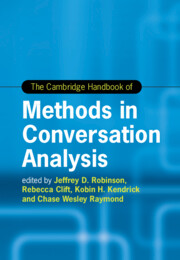Book contents
- Frontmatter
- Contents
- List of Tables
- List of Contributors
- Part I Introduction
- Part II Points of Departure
- 2 Conversation-Analytic Methods of Data Collection
- 3 Collecting Interaction Data in the ‘Lab’ versus the ‘Field’: Rationale, Ramifications, and Recommendations
- 4 Working with Data I: Field Recordings
- 5 Multimodal Transcription as Process and Analysis: Capturing the Audible and Visible
- 6 Discovering a Candidate Phenomenon
- 7 Data Sessions
- Part III Collections
- Part IV Evidence
- Part V Avenues into Action
- Part VI Situating and Reporting Findings
- Part VII Looking Forward
- Appendix I Jeffersonian Transcription Conventions
- Appendix II Multimodal Transcription Conventions
- Index
2 - Conversation-Analytic Methods of Data Collection
from Part II - Points of Departure
Published online by Cambridge University Press: 06 December 2024
- Frontmatter
- Contents
- List of Tables
- List of Contributors
- Part I Introduction
- Part II Points of Departure
- 2 Conversation-Analytic Methods of Data Collection
- 3 Collecting Interaction Data in the ‘Lab’ versus the ‘Field’: Rationale, Ramifications, and Recommendations
- 4 Working with Data I: Field Recordings
- 5 Multimodal Transcription as Process and Analysis: Capturing the Audible and Visible
- 6 Discovering a Candidate Phenomenon
- 7 Data Sessions
- Part III Collections
- Part IV Evidence
- Part V Avenues into Action
- Part VI Situating and Reporting Findings
- Part VII Looking Forward
- Appendix I Jeffersonian Transcription Conventions
- Appendix II Multimodal Transcription Conventions
- Index
Summary
This chapter provides an overview of methods for data collection in Conversation Analysis and practical advice on collecting interactional data. We touch on several recurrent issues that researchers encounter in the process. These issues include accessing data; the use of existing data (including user-uploaded, like YouTube); navigating gatekeepers in accessing a setting; building trust with members of a setting; building ethnographic understanding of activities under examination; obtaining ethical approvals; protecting privacy of participants; methods and materials for informed consent (including with populations with diminished capacities); devising a recording schedule; deciding when/how often to record; selecting the right quantity and type of recording equipment; considerations of spatial and audio environments; the use of alternative technologies for recording; recording mediated interactions; procedures and check-lists for before recording; positioning and framing the camera; when to press record and when to press stop; navigating the presence of the researcher-recorder on site; and gathering supplementary documentation from the setting.
Information
- Type
- Chapter
- Information
- Publisher: Cambridge University PressPrint publication year: 2024
Accessibility standard: Unknown
Why this information is here
This section outlines the accessibility features of this content - including support for screen readers, full keyboard navigation and high-contrast display options. This may not be relevant for you.Accessibility Information
- 1
- Cited by
